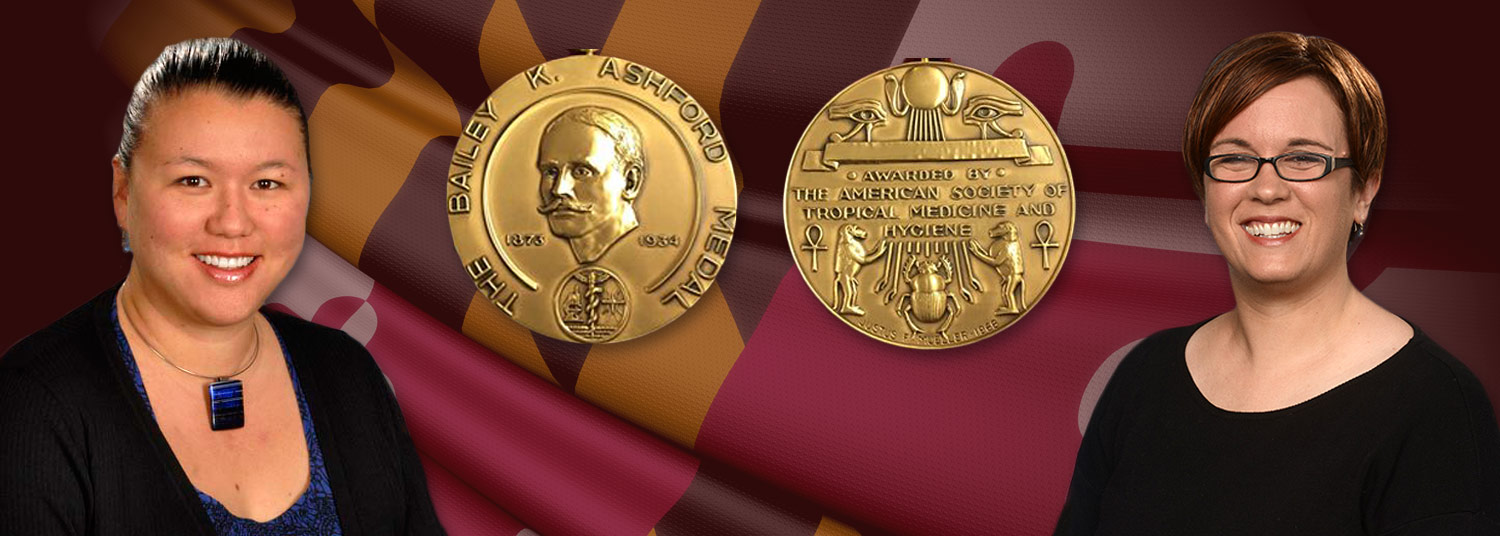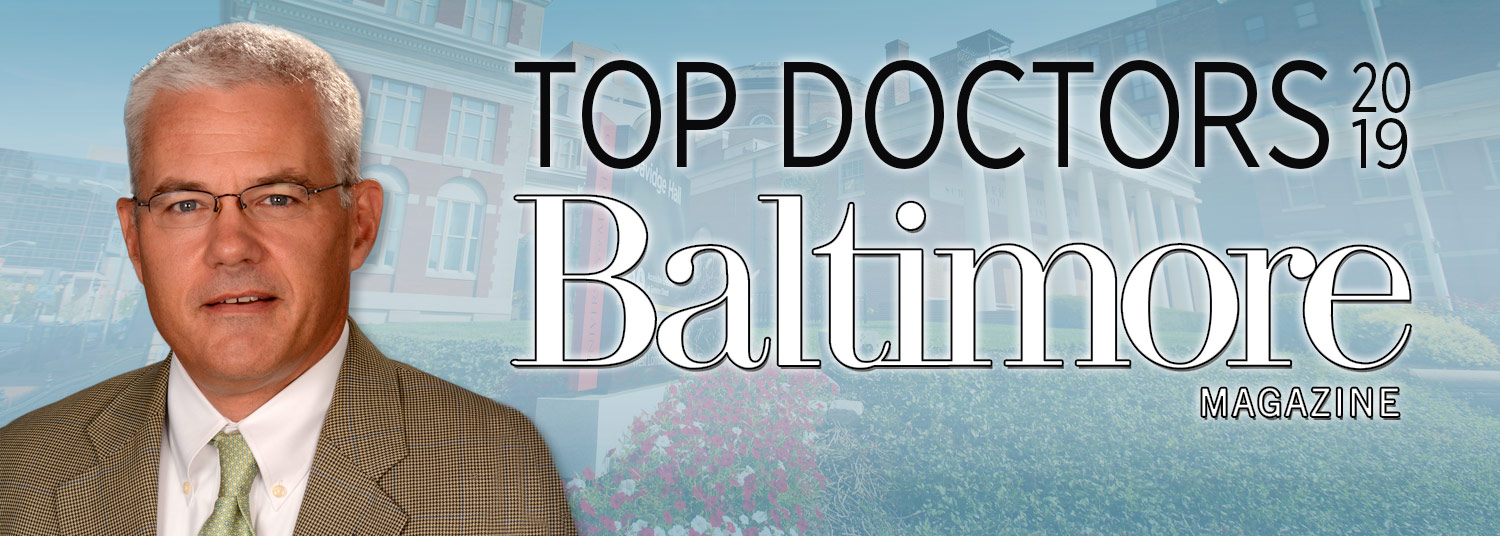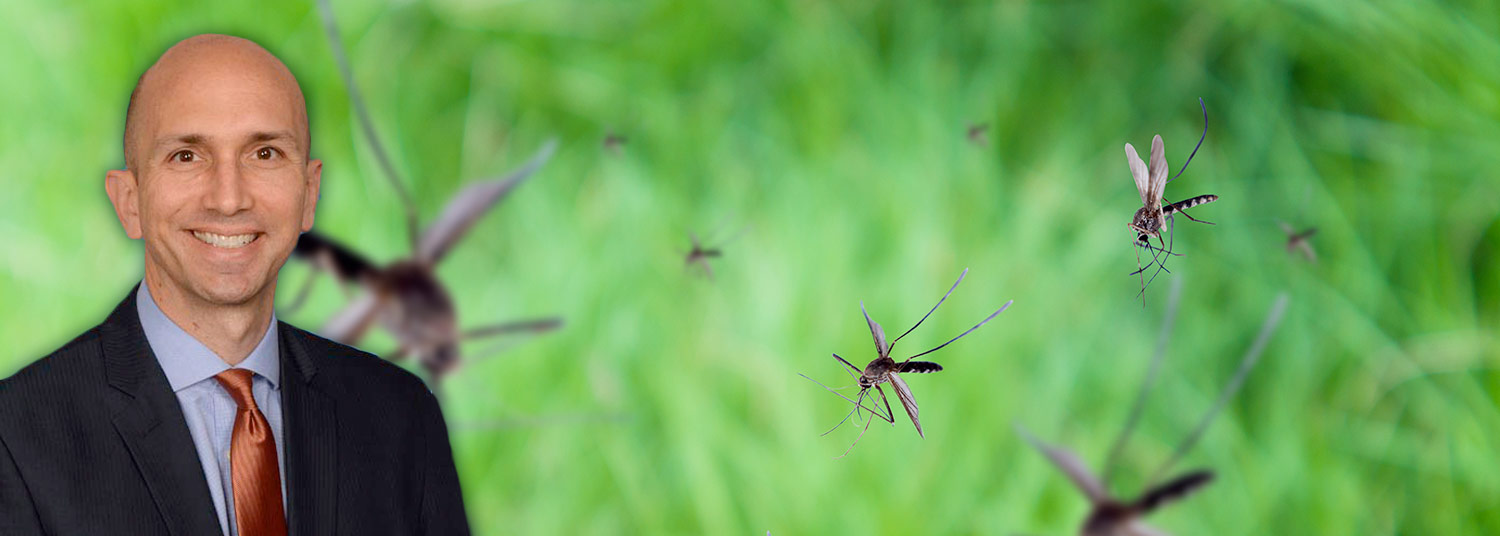December 10, 2019 | Joanne Morrison
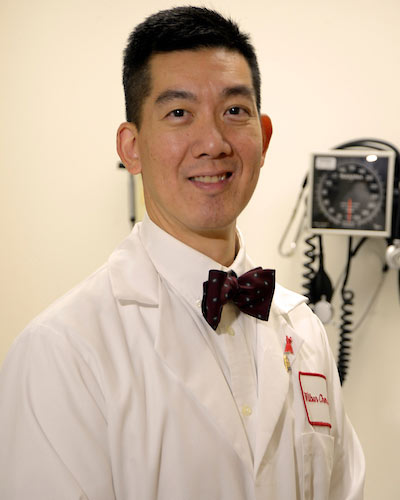
Dr. Wilbur Chen and Dr. Eileen Barry Will Test a Vaccine Developed at UMSOM, With $4.5 Million in Funding from Emergent BioSolutions
Each year, millions of people contract serious diarrheal illnesses typically from contaminated food and water. Among the biggest causes of diarrheal diseases are the bacteria Shigella and enterotoxigenic Escherichia coli (ETEC), and researchers at the University of Maryland School of Medicine (UMSOM) are testing a vaccine designed to offer protection against these serious pathogens.
Wilbur Chen, MD, MS, Associate Professor of Medicine, is Principal Investigator, and Eileen Barry, PhD, Professor of Medicine, is co-Principal Investigator for this research, which is being funded by a $4.5 million agreement with Emergent BioSolutions, a global life sciences company focused on addressing public health threats, including travel health diseases.
 Drs. Chen and Barry will conduct early clinical trials of a combined Shigella-ETEC vaccine called “CVD 1208S-122,” a vaccine comprised of a weakened live strain of Shigella expressing protective antigens from ETEC that was developed at UMSOM’s Center for Vaccine Development and Global Health (CVD).
Drs. Chen and Barry will conduct early clinical trials of a combined Shigella-ETEC vaccine called “CVD 1208S-122,” a vaccine comprised of a weakened live strain of Shigella expressing protective antigens from ETEC that was developed at UMSOM’s Center for Vaccine Development and Global Health (CVD).
Their research will test the safety, tolerability and potential protection of oral doses of the prototype Shigella-ETEC vaccine. The trials will include testing how the immune system in healthy adults responds to varying doses of the vaccine. The goal is to determine the safety and best dosing of the vaccine, which could ultimately protect millions of people around the world who are at most risk to diarrheal diseases.
“Our goal here is to develop a vaccine that can be delivered broadly to those who are most susceptible to the risks of these diseases,” said Dr. Chen. “This is something that can help serve the most vulnerable populations in low resource settings in sub-Sahara Africa and South Asia, where the disease burden is highest.”
Development of the vaccine has been years in the making. Ultimately, it will be comprised of several weakened strains of Shigella, expressing a wide array of ETEC antigens, enabling the body’s immune system to generate antibodies and cellular protection against these diarrheal pathogens. Researchers at CVD, including Dr. Barry, have been constructing optimized vaccine components and analyzing their performance in preclinical studies to develop the best form of protection. Development of additional vaccine components will be supported by this partnership with Emergent.
"Development of this vaccine was based on epidemiologic studies that identified the most important strains and antigens associated with disease and included extensive genome analysis and pre-clinical testing,” said Dr. Barry. According to the World Health Organization (WHO), Shigella and ETEC are two of the leading causes of diarrhea worldwide. It is estimated that these two bacteria alone are responsible for more than 15 percent of the approximately 500,000 deaths among children under the age of five.
“One of the ways Emergent furthers its mission – to protect and enhance life – is to invest in scientific research and development by organizations that are aligned with our focus on improving public health,” said Kelly Lyn Warfield, PhD, VP, Vaccines Research and Development at Emergent BioSolutions. “As a leader in emerging infectious diseases and travel health vaccines, we are pleased to partner with UMSOM to advance a potential vaccine to protect against Shigella and ETEC, two leading causes of diarrhea worldwide.”
In addition to the risk of child mortality, CVD research has shown that repeated infections and episodes of diarrheal diseases can lead to stunted growth in young children and impaired physical and cognitive development. Individuals typically contract Shigella and ETEC infection by ingesting contaminated food and water, but these illnesses can also be contracted through close direct contact with others who are infected.
“We know that diarrheal diseases are a leading cause of mortality for children. This research at the Center for Vaccine Development and Global Health is a critical step in helping to protect the most vulnerable children world-wide. Our expertise in clinical trials will help set the stage toward final delivery of an important vaccine that could impact millions,” said Kathleen Neuzil, MD, MPH, the Myron M. Levine Professor in Vaccinology, Professor of Medicine and Pediatrics and Director of the CVD.
Diarrheal diseases can typically be treated through rehydration therapy and with antibiotics for travelers to countries and regions where there is a high prevalence. However, many who are exposed to these pathogens -- children under the age of five and others in low resource settings -- do not always have access to these treatments. A vaccine, when finally tested and approved, could offer broad protection.
“Diarrheal diseases are one of the biggest challenges in global health. Our researchers at the University of Maryland School of Medicine have developed critical tools to protect children and others in settings where there is high risk. This work not only tackles some of the most challenging diseases, but it will ultimately impact millions of people around the world,” said E. Albert Reece, MD, PhD, MBA, Executive Vice President for Medical Affairs at UM Baltimore, and the John Z. and Akiko K. Bowers Distinguished Professor and Dean, University of Maryland School of Medicine.
About the University of Maryland School of Medicine
Now in its third century, the University of Maryland School of Medicine was chartered in 1807 as the first public medical school in the United States. It continues today as one of the fastest growing, top-tier biomedical research enterprises in the world -- with 43 academic departments, centers, institutes, and programs; and a faculty of more than 3,000 physicians, scientists, and allied health professionals, including members of the National Academy of Medicine and the National Academy of Sciences, and a distinguished recipient of the Albert E. Lasker Award in Medical Research. With an operating budget of more than $1 billion, the School of Medicine works closely in partnership with the University of Maryland Medical Center and Medical System to provide research-intensive, academic and clinically based care for more than 1.2 million patients each year. The School has over 2,500 students, residents, and fellows, and more than $540 million in extramural funding, with most of its academic departments highly ranked among all medical schools in the nation in research funding. As one of the seven professional schools that make up the University of Maryland, Baltimore campus, the School of Medicine has a total workforce of nearly 7,000 individuals. The combined School and Medical System (“University of Maryland Medicine”) has an annual budget of nearly $6 billion and an economic impact more than $15 billion on the state and local community. The School of Medicine faculty, which ranks as the 8th highest among public medical schools in research productivity, is an innovator in translational medicine, with 600 active patents and 24 start-up companies. The School works locally, nationally, and globally, with research and treatment facilities in 36 countries around the world. Visit medschool.umaryland.edu
About the UMSOM Center for Vaccine Development and Global Health
For over 40 years, researchers in the Center for Vaccine Development and Global Health have worked domestically and internationally to develop, test, and deploy vaccines to aid the world’s underserved populations. CVD is an academic enterprise engaged in the full range of infectious disease intervention from basic laboratory research through vaccine development, pre-clinical and clinical evaluation, large-scale pre-licensure field studies, and post-licensure assessments. CVD has worked to eliminate vaccine-preventable diseases. CVD has created and tested vaccines against cholera, typhoid fever, paratyphoid fever, non-typhoidal salmonella disease, shigellosis (bacillary dysentery), Escherichia coli diarrhea, nosocomial pathogens, tularemia, influenza, and other infectious diseases. CVD’s research covers the broader goal of improving global health by conducting innovative, leading research in Baltimore and around the world. CVD researchers are developing new and improved ways to diagnose, prevent, treat, control, and eradicate diseases of global impact. Currently, these diseases include malaria, typhoid, Shigella and other vaccine-preventable infectious diseases. CVD researchers have been involved in critical vaccine development for emerging pathogens such as Zika and Ebola. In addition, CVD’s work focuses on the ever-growing challenge of anti-microbial resistance.
About Emergent BioSolutions Inc
Emergent BioSolutions Inc. is a global life sciences company seeking to protect and enhance life by focusing on providing specialty products for civilian and military populations that address accidental, deliberate, and naturally occurring public health threats. We aspire to be a Fortune 500 company recognized for protecting and enhancing life, driving innovation, and living our values. Additional information about the company may be found at www.emergentbiosolutions.com. Find us on LinkedIn and follow us on Twitter @emergentbiosolu and Instagram life_at_emergent.
Contact
Joanne Morrison
Director of Marketing and Public Relations
University of Maryland School of Medicine
jmorrison@som.umaryland.edu
Office: (410) 706-2884
Mobile: (202) 841-3369
Related stories
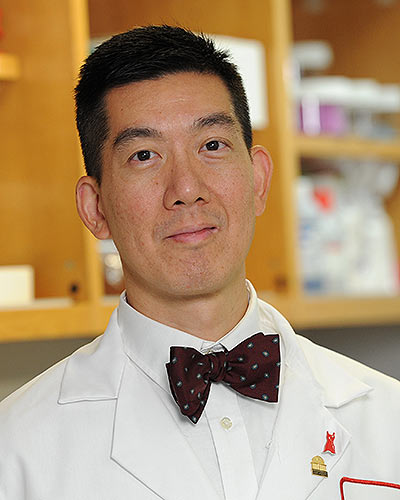
Wednesday, October 08, 2025
New Vaccine Shows Promise Against Typhoid and Invasive Salmonella in First Human Trial
Researchers at the University of Maryland School of Medicine’s Center for Vaccine Development and Global Health (CVD) have completed a successful Phase 1 clinical trial of a novel vaccine designed to protect against both typhoid fever and invasive non-typhoidal Salmonella--two major causes of illness and death among children in sub-Saharan Africa.

Wednesday, March 12, 2025
Meningococcal Vaccine Found to be Safe and Effective for Infants in Sub-Saharan Africa
University of Maryland School of Medicine (UMSOM) researchers helped conduct an important new global health study that found a vaccine that protects against five strains of meningitis prevalent in sub-Saharan Africa is safe and effective for use in young children beginning at 9 months of age. This study provided evidence that formed the basis for the World Health Organization’s (WHO) decision last year to recommend the pentavalent Men5CV meningitis vaccine for infants ages 9 months and older.
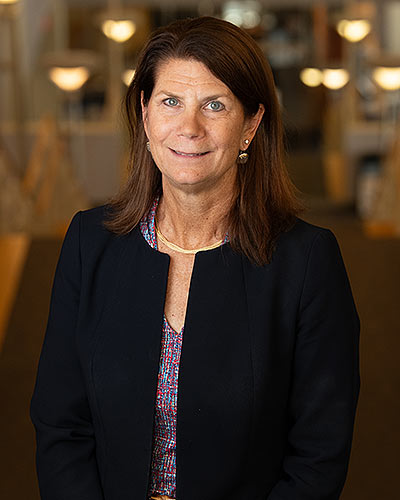
Thursday, March 28, 2024
NIH selects Dr. Kathleen Neuzil as Director of The Fogarty International Center
Kathleen M. Neuzil, MD, MPH, Director of the University of Maryland School of Medicine’s (UMSOM) Center for Vaccine Development and Global Health, has been named the 13th director of the Fogarty International Center (FIC), which is part of the National Institutes of Health (NIH). Dr. Neuzil will be the first woman to hold the permanent directorship since the center’s founding in 1968 and will also hold the position of Associate Director for International Research at NIH.

Monday, October 02, 2023
UM School of Medicine Researchers Present Interim Results on Meningococcal Vaccine for Infants and Young Children in Africa
University of Maryland School of Medicine (UMSOM) researchers, as part of the Infectious Diseases Clinical Research Consortium (IDCRC), provided an interim analysis showing that the pentavalent (NmCV-5) meningitis vaccine is safe for use in 9-month-old infants in the meningitis belt of sub-Saharan Africa. They presented their results to the World Health Organization’s (WHO) Strategic Advisory Group of Experts (SAGE) on Immunization on September 26.
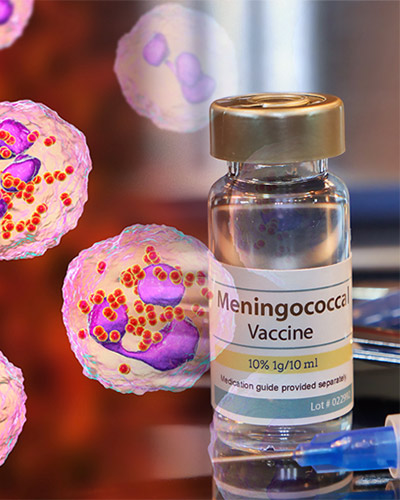
Thursday, March 24, 2022
UM School of Medicine Leads Research to Assess Meningococcal Vaccine for Infants and Young Children in Africa
Researchers at the University of Maryland School of Medicine (UMSOM)’s Center for Vaccine Development & Global Health (CVD) are leading a study to evaluate the use of a pentavalent – or five in one – meningococcal conjugate vaccine (NmCV-5) among infants and young children in the meningitis belt of sub-Saharan Africa. This is the final and pivotal study for World Health Organization (WHO) prequalification of this vaccine, which is the last stage to make the vaccine available for low- and middle-income countries.
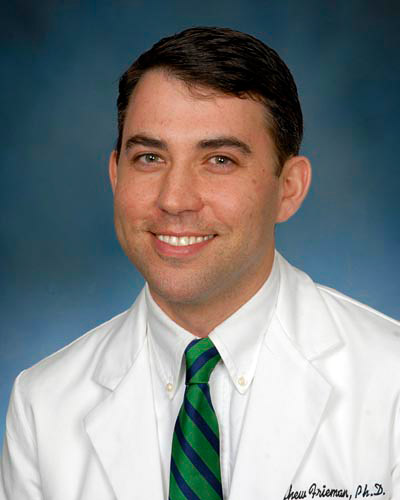
Friday, February 05, 2021
UM School of Medicine Researchers Demonstrate Strong Immune Response for New COVID-19 Vaccine in Pre-Clinical Tests
Researchers at the University of Maryland School of Medicine (UMSOM) have found promising results in pre-clinical studies for a new experimental vaccine against COVID-19 made by Novavax. The vaccine was found to generate a robust immune response in animals exposed to the vaccine with strong data indicating safety and efficacy, according to the study published recently in the journal Nature Communications. The results have been used to begin testing the vaccine in human trials in the U.S. with a Phase 3 trial that recently launched at the UMSOM’s Center for Vaccine Development and Global Health.

Wednesday, January 27, 2021
Dr. Wilbur Chen, Nationally-Recognized Vaccine Researcher, Selected for Federal Committee that Guides Immunization Policies
Wilbur H. Chen, MD, MS, FIDSA, FACP, Professor of Medicine at the University of Maryland School of Medicine (UMSOM), has been named a new voting member of the federal government’s Advisory Committee on Immunization Practices (ACIP), the prestigious board of experts that makes recommendations on the safe use of vaccines for Americans. The U.S. Department of Health and Human Services selected Dr. Chen for the 15-member advisory committee based on his expertise and national leadership in vaccinology, infectious diseases, public health, and preventive medicine. He will remain in his current role at UMSOM while he serves in his four-year term, which began last month.
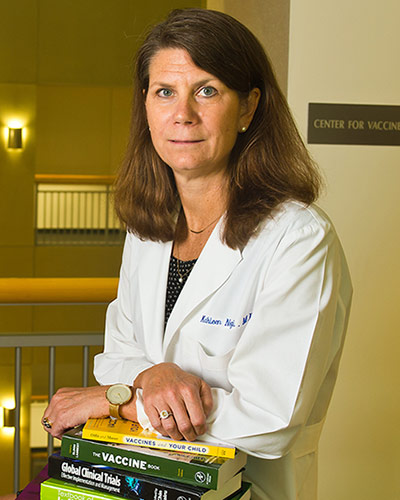
Friday, September 20, 2019
UM School of Medicine's Center for Vaccine Development and Global Health Receives NIH Contract of up to More than $200 Million for Influenza Research
Kathleen Neuzil, MD, MPH, Professor of Medicine and Pediatrics and Director of the Center for Vaccine Development and Global Health (CVD) at the University of Maryland School of Medicine (UMSOM) and Dean E. Albert Reece, MD, PhD, MBA, announced that CVD has been awarded a contract from the National Institute of Allergy and Infectious Diseases (NIAID), with total funding up to more than $200 million over seven years if all contract options are exercised.
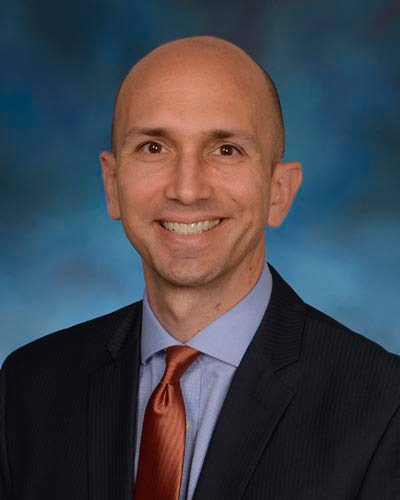
Tuesday, August 13, 2019
UM School of Medicine Researchers Begin Phase 1 Clinical Trial of Vaccine Against Mosquito-Borne Diseases
Mosquito-borne diseases including malaria, dengue and yellow fever, have a severe impact resulting in millions of deaths worldwide, hitting the world’s most vulnerable populations the hardest. Researchers at the University of Maryland School of Medicine (UMSOM) have begun testing an experimental vaccine that is designed to protect against a series of these diseases.
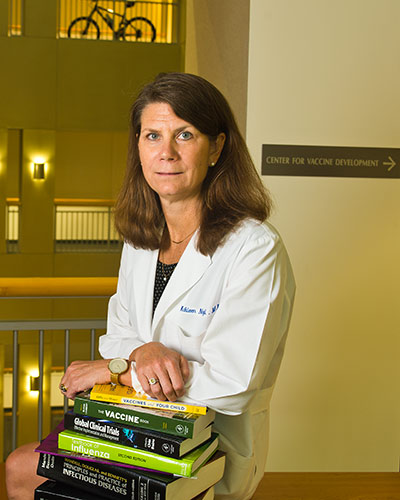
Friday, November 02, 2018
UMSOM Global Health Expert Named to Prestigious World Health Organization Immunization Panel
Kathleen Neuzil, MD, MPH, Professor of Medicine and Pediatrics and Director of the Center for Vaccine Development and Global Health (CVD) at the University of Maryland School of Medicine (UMSOM), has been named to the World Health Organization’s (WHO) Strategic Advisory Group of Experts (SAGE) on Immunization.

Wednesday, June 06, 2018
UMSOM Researchers Find that Silent Carriers of Malaria are Unlikely to Develop the Disease
In regions where malaria illness is widespread, it is common to find many individuals who are infected with malaria parasites (Plasmodium falciparum), but without symptoms. New research conducted by the University of Maryland School of Medicine (UMSOM) shows that treating these silent malaria cases could help stop the spread of malaria to others.
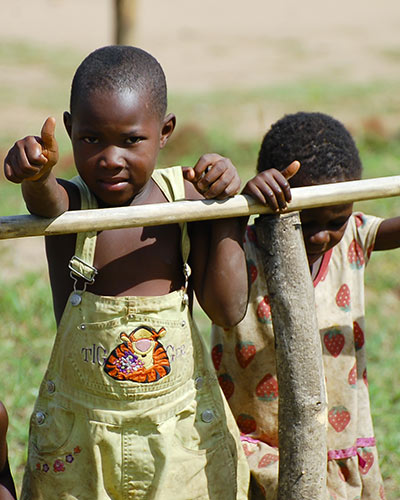
Tuesday, May 15, 2018
Tackling Malaria Transmission in Sub-Saharan Africa
Two malaria experts in the Center for Vaccine Development and Global Health at the University of Maryland School of Medicine wrote a commentary published in the June Issue of The Lancet Global Health discussing the prevalence of malaria in school-age children in sub-Saharan Africa. Miriam Laufer, MD, Associate Professor of Pediatrics and Associate Director for Malaria Research CVD, and Lauren Cohee, MD, Instructor, Pediatrics, noted that often malaria infection is more common in school-age children than younger children and adults.
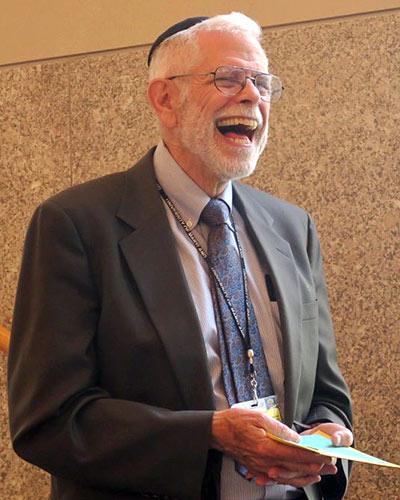
Friday, May 11, 2018
Honoring Dr. Robert Edelman for Three Decades of Service at UMSOM
Dr. Robert Edelman’s legacy will live long past his tenure at the Center for Vaccine Development and Global Health (CVD). Prior to an esteemed career in academia, he served in the military and the US public health service.

Thursday, May 03, 2018
Low Efficacy Influenza Vaccines Can Still Significantly Avert Infections, Study Shows
Research published in PNAS, showed that even less effective influenza vaccines can still help to reduce illnesses, hospitalizations and other issues as long as the vaccine is broadly administered across age groups.
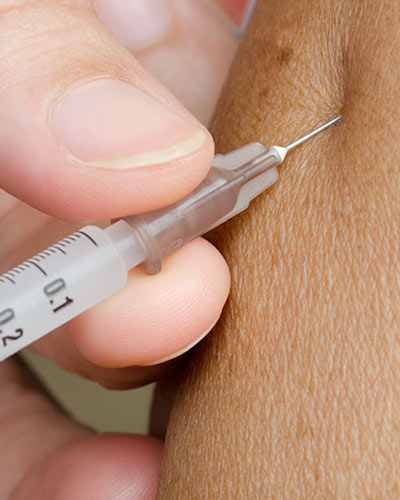
Tuesday, March 20, 2018
UMSOM Vaccine Experts Lead Trial on Avian Flu Vaccine
Vaccine experts at the University of Maryland School of Medicine (UMSOM) have begun multiple clinical trials of vaccines designed to protect against H7N9, an avian influenza virus that was first reported in humans in 2013 in China.
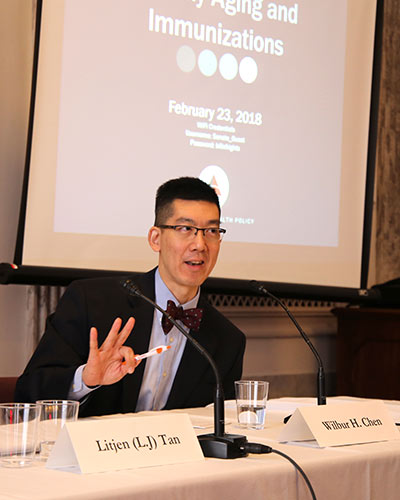
Friday, February 23, 2018
UMSOM Vaccine Expert Highlights Need for Vaccination Among Older Adults During Capitol Hill Briefing
Today at a briefing on Capitol Hill, Wilbur Chen, MD, MS, Associate Professor of Medicine at the University of Maryland School of Medicine, warned that the U.S. population of adults 65 and older is expected to rise significantly over the next few decades, making vaccinations against diseases like influenza, pneumonia and shingles for this population very critical.


